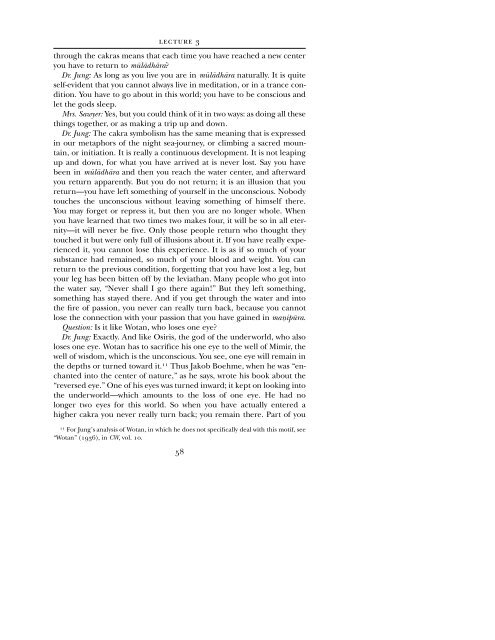CG JUNG - Countryside Anarchist
CG JUNG - Countryside Anarchist
CG JUNG - Countryside Anarchist
Create successful ePaper yourself
Turn your PDF publications into a flip-book with our unique Google optimized e-Paper software.
LECTURE 3<br />
through the cakras means that each time you have reached a new center<br />
you have to return to mÖlvdhvra?<br />
Dr. Jung: As long as you live you are in mÖlvdhvra naturally. It is quite<br />
self-evident that you cannot always live in meditation, or in a trance condition.<br />
You have to go about in this world; you have to be conscious and<br />
let the gods sleep.<br />
Mrs. Sawyer: Yes, but you could think of it in two ways: as doing all these<br />
things together, or as making a trip up and down.<br />
Dr. Jung: The cakra symbolism has the same meaning that is expressed<br />
in our metaphors of the night sea-journey, or climbing a sacred mountain,<br />
or initiation. It is really a continuous development. It is not leaping<br />
up and down, for what you have arrived at is never lost. Say you have<br />
been in mÖlvdhvra and then you reach the water center, and afterward<br />
you return apparently. But you do not return; it is an illusion that you<br />
return—you have left something of yourself in the unconscious. Nobody<br />
touches the unconscious without leaving something of himself there.<br />
You may forget or repress it, but then you are no longer whole. When<br />
you have learned that two times two makes four, it will be so in all eternity—it<br />
will never be five. Only those people return who thought they<br />
touched it but were only full of illusions about it. If you have really experienced<br />
it, you cannot lose this experience. It is as if so much of your<br />
substance had remained, so much of your blood and weight. You can<br />
return to the previous condition, forgetting that you have lost a leg, but<br />
your leg has been bitten off by the leviathan. Many people who got into<br />
the water say, “Never shall I go there again!” But they left something,<br />
something has stayed there. And if you get through the water and into<br />
the fire of passion, you never can really turn back, because you cannot<br />
lose the connection with your passion that you have gained in maõipÖra.<br />
Question: Is it like Wotan, who loses one eye?<br />
Dr. Jung: Exactly. And like Osiris, the god of the underworld, who also<br />
loses one eye. Wotan has to sacrifice his one eye to the well of Mimir, the<br />
well of wisdom, which is the unconscious. You see, one eye will remain in<br />
the depths or turned toward it. 11 Thus Jakob Boehme, when he was “enchanted<br />
into the center of nature,” as he says, wrote his book about the<br />
“reversed eye.” One of his eyes was turned inward; it kept on looking into<br />
the underworld—which amounts to the loss of one eye. He had no<br />
longer two eyes for this world. So when you have actually entered a<br />
higher cakra you never really turn back; you remain there. Part of you<br />
11 For Jung’s analysis of Wotan, in which he does not specifically deal with this motif, see<br />
“Wotan” (1936), in CW, vol. 10.<br />
58


